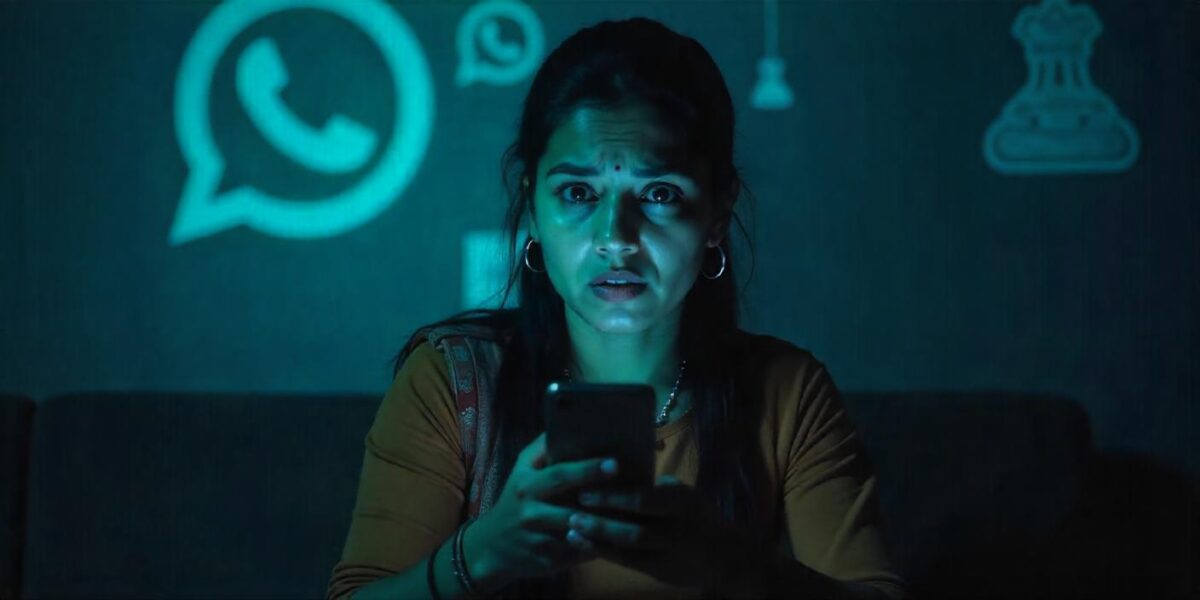It started like any other weekday for Aakansha — a marketing executive from Delhi who was wrapping up a work call when her phone buzzed with a strange WhatsApp message.
“Hi ma’am, this is from FedEx. We’ve intercepted a suspicious parcel at Mumbai Customs under your name. It contains illegal documents and narcotics. Are you aware of this?”
She paused. “What? No… I haven’t sent any parcel,” she replied, confused.
The voice on the other end didn’t sound like a spammer. It was calm, official, and disturbingly assertive.
“This is a serious matter. You’ll be transferred to the Cyber Cell of Mumbai Police now. Please don’t disconnect.”
When Fear Sounds Like Protocol
Seconds later, the tone shifted. A new voice came on the line.
“We’ve checked the parcel. Five passports, some MDMA, and links to money laundering. Your Aadhaar was used. It doesn’t look good.”
Aakansha sat up straight. “No, no, that’s not possible. I haven’t done anything illegal.”
“Then you need to cooperate, madam,” the voice cut her off.
“We suspect your identity has been misused, but till that’s clear, you are under investigation. This call is being recorded. You are not allowed to speak to anyone.”
What followed was a carefully scripted web of fear.
She was shown a fake letter from the Reserve Bank of India, an arrest notice stamped and signed digitally, and even screenshots of supposed bank account seizures.
To prove her “innocence,” Aakansha was told to move ₹1.10 lakh to a “safe account” — one that the RBI would later refund after verification.
She obeyed. Why wouldn’t she? The documents looked real. The voices sounded official. And the fear? That part was very, very real.
The Silence After the Scam
By the time the truth sank in, it was too late. The number was unreachable. The documents had vanished from WhatsApp. And her bank account was lighter by over a lakh.
Aakansha rushed to the nearest police station.
She tried explaining everything, the WhatsApp calls, the fake officers, the threats, the urgency. But what she met was apathy.
“Scam ho gaya toh FIR likhwa do. Itna kya emotional ho rahi ho?” one of the officers muttered.
She came home shaken, not just by the scam, but by how alone she felt after it.
And then she did what so many others in her place have begun doing — she took her story online.
A Video That Spoke Louder Than a Complaint
With trembling hands and teary eyes, Aakansha recorded a short video.
She wasn’t reading from a script. She was just speaking — raw, broken, angry.
“If this can happen to me, it can happen to anyone. I reported everything. They had all the proof. But no one helped. Not the bank, not the police, no one.”

The video went viral. Shared across Instagram and Twitter, it became a wake-up call for thousands.
And yet, no authority reached out. No formal investigation was launched into the scammers behind the fraud. The silence was louder than the views.
She’s Not Alone
Aakansha isn’t the only one.
In Rajasthan, a 70-year-old woman was digitally “quarantined” by scammers pretending to be cyber cops.
Over 7 days, they emotionally manipulated her into transferring over ₹80 lakh — her life’s savings — for a case that didn’t even exist.
These aren’t just “calls from Nigeria” anymore. This is organized fraud. Indian voices, Indian scripts, Indian paperwork — designed for Indian fears.
What’s Missing?
It’s not awareness. It’s an action.
Aakansha did everything she was supposed to — reported the fraud, documented the evidence, and shared her story.
Still, the system let her down.
Scams like this aren’t just about money. They shake a person’s trust in institutions, in support, in justice.
So, What Can You Do?
If you ever get a call like this, stop.
Don’t act out of fear. Don’t let isolation cloud your judgment. Hang up, call back via official government numbers, and talk to someone — a family member, a lawyer, even a stranger on the internet who might know better.
Because, as Aakansha learned the hard way, the longer you stay silent, the louder the scammers get.
And sometimes, no one listens… until a video goes viral.







